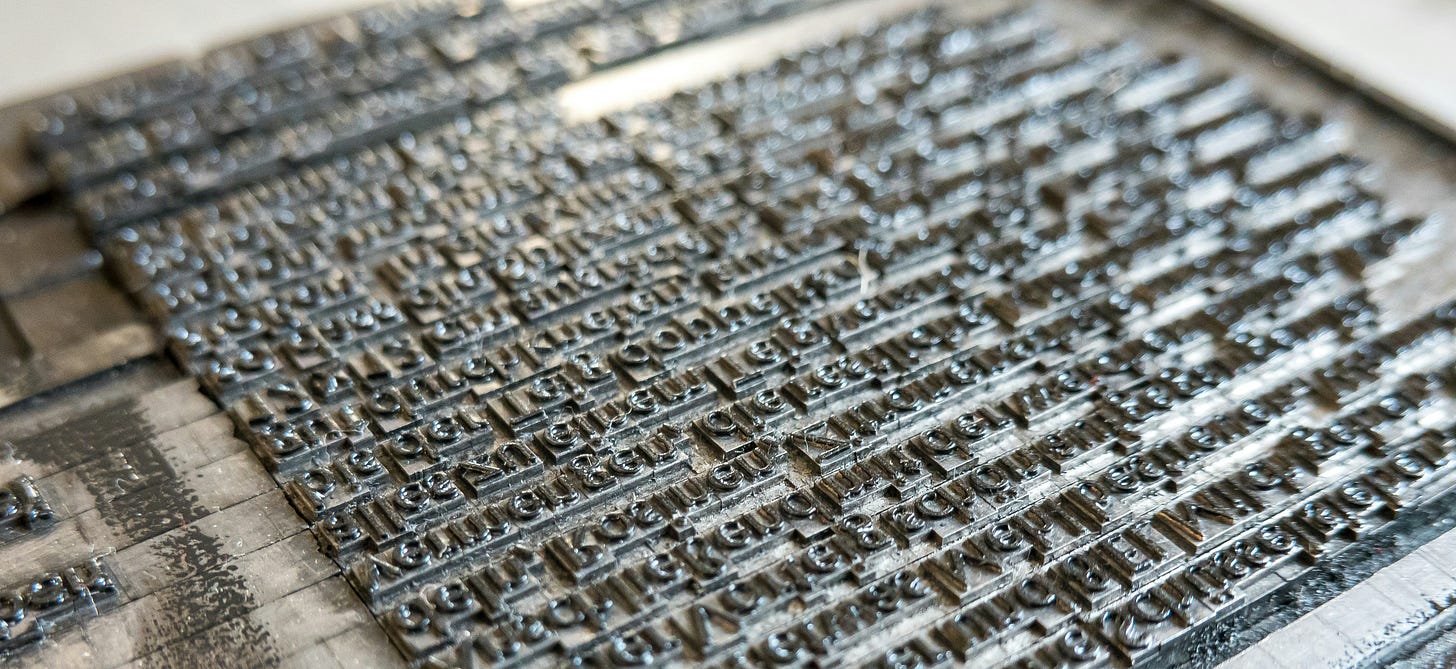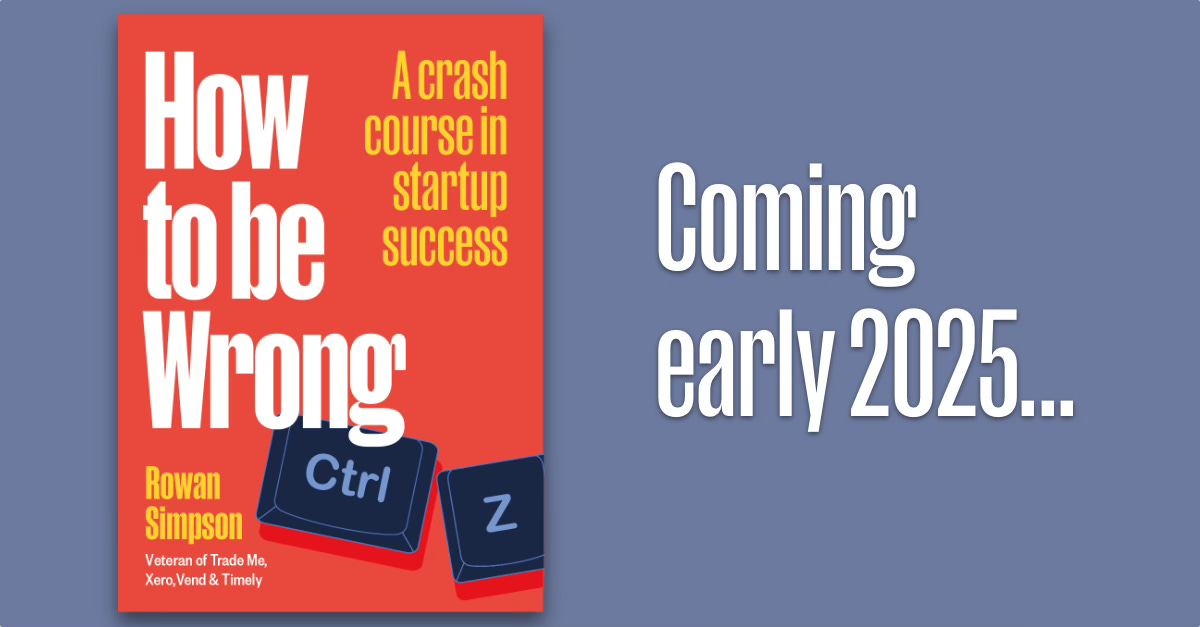Ctrl-Z
Announcing "How to be Wrong" - coming early 2025
🚀 Launch
I have some news: I’ve written a book. Actually, I’ve been writing a book for a while now, long before I even realised it. I’m excited to start talking about it today, ahead of it hitting shelves (literally) early next year.
It’s called How to be Wrong: a crash course in startup success.
I published my first blog post in late 2006, so this book is the culmination of nearly 18 years of thinking about and then writing about startups and how to build and grow new businesses. And, more importantly, all of the iteration and refinement — plus some disagreement — that happened during that time, which made the ideas better.
I’ve worked on and invested in some of New Zealand’s most successful startups: Trade Me, Xero, Vend and Timely. Some of those have become household names. But I got to know each of them at the very beginning, when their success was far from obvious. Meanwhile other less successful startups I’ve worked on are mostly forgotten, but still taught me a lot. All the way through I’ve tried to share what I was learning. It’s really satisfying to bring these lessons together in one place.
When a business grows rapidly and is sold for hundreds of millions of dollars it’s easy to focus on the end point, and forget about the route. When the stories are re-told over and over, details get re-written or forgotten. And the bits that are omitted and updated are nearly always the stumbles or backward steps. That allows a mythology to grow around startups that is deeply unhelpful to anybody working on their own early-stage business, or thinking about it. Collectively, we pin our hopes of improving economic circumstances on creating more of these types of companies, but we ignore many of the important aspects of those past successes.
Maybe I can cut through some of that?
I’ll have a lot more to say about this over the next couple of months. To be the first to know about pre-sales and launch details please subscribe for updates on howtobewrongbook.com.
I can’t wait to hear what you think. Stay tuned…
🛠️ Deconstruct
When something fascinates you, pay attention to the details. The person who thinks, "That was cool" is a consumer. The person who thinks, "How did they make something that cool?" is on the path to being a creator. Don't just taste the recipe, look for the ingredients.
— James Clear
You can tell a lot about somebody based on the questions they ask. For many people, it’s enough to live in the world, and take for granted that it is the way it is. But I’ve learned it’s much more rewarding to be curious — wonder about how things were made; what were the trade-offs; what were the difficult bits; who was involved, and what different roles did they play; aside from the core product that’s been produced and sold, what are the other factors that make it successful (or not) — how is it branded, and promoted and sold and supported?
Over the last few months, as the writing was completed and I started working on production and marketing, it’s been interesting to learn a bit about how books are actually designed and made. There are many links in the chain between an author having an idea and a reader consuming it, and it’s fascinating to me at least to understand which of those are profitable (or not) and which of those are valuable (or not).1
Understanding how things are made - whether books or hit songs - often comes down to asking the right questions. That's exactly what I'll be doing on Tuesday at Sunrise, where I have the privilege to chat with Joel Little. He's spent his career helping artists turn raw talent into global hits, from Lorde to Khalid to Taylor Swift and many in between. I look forward to asking him how he chooses who to work with, what changes after you’ve written a phenomenal global hit song (and how he copes with the sometimes long gaps between those), and how he’s managed to stay so balanced in a world of literal rock stars. It should be fun.
For those of you lucky enough to have grabbed tickets before they sold out ... maybe see you there? Otherwise, look forward to some of what I learn to pop up in future Top Three posts.
🔁 Repeat
People have been writing down their stories — and business lessons — for a long time.
For example, Plutarch, who was born in Greece nearly 2000 years ago, and over the next 70-odd years of his life became one of the most influential biographers, philosophers, and essayists, as well as a priest at the famous Temple of Apollo at Delphi, bridging the Greek and Roman intellectual worlds during the height of the Roman Empire.
One of his books, "Moralia", is a collection of 78 essays and transcribed lectures on topics ranging from ethics and philosophy to marriage advice and dinner party conversation. It includes the story of a wealthy ship owner from Delos, a small Greek Island about 5 km southwest of Mykonos, that became a tax haven at the heart of Mediterranean trade routes.2 Plutarch uses this as the frame for a lesson about the nature of compound success:
When asked how he built his considerable fortune, the merchant responded with disarming candour: 'The greater part came quite easily,' he said, 'but the first, smaller part took time and effort.'
You might be familiar with that line - or at least one of the many variations of it. It’s clever and obviously true.
But the opposite is also true. When we’re working on our first venture we really have nothing to lose. Nobody is paying much attention — we might worry that everybody is watching but if we’re honest we will acknowledge that in reality almost nobody actually is, and those that are don’t really care as much as we assume. Everybody expects us to fail - at least nobody will be surprised if that’s the outcome. Those things combined are a huge advantage.
All of those flip around when somebody who has been successful in their first venture starts working on their second. Plus by then we have the baggage of all of the things we think we learned from the first venture that were really just cargo cults. That’s why artists who have had a big hit often struggle to have a second, and why it’s even more remarkable when the follow-up is better than the debut — perhaps that’s something else I should ask Joel about on Tuesday?
This is the lesson: look out for the things that everybody agrees with, and common wisdom which is repeated, which might not be right. Often, that’s where the opportunities are hiding in plain sight.
That’s how to be wrong.
Photo by Etienne Girardet on Unsplash
There is of course one big problem with being curious: Sometimes knowing how the sausage is made means you never want to eat sausages again.
Today, Delos is an uninhabited archaeological site and UNESCO World Heritage location, but in its heyday, it was one of the wealthiest and most cosmopolitan ports in the Mediterranean world.




Very much looking forward to your book Rowan. Timing is superb - I’ve just stepped away from leading BoardPro and am laying around with new startup ideas.